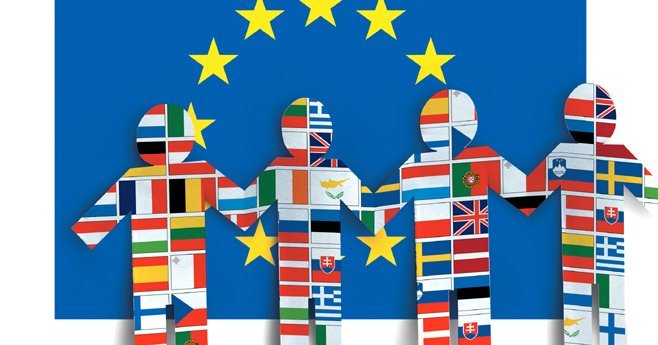“Without Monnet there would have been no Schuman plan, without Schuman there would have been no ECSC”. During the winter 1949 – 1950, Americans press the French government to accept Germany’s rearmament. Robert Schuman is Minister for Foreign Affairs, has to choose between a rearmament that is unacceptable for many French people and an impossible refusal to oppose to the Americans who fear that a demilitarized Germany ends up falling in the soviet lap. Jean Monnet then proposes a “crazy idea in the Monnet style” and introduce his project to Schuman put together the French and German coal and steel productions. If Jean-René Rabier wasn’t working for Monnet yet, he was there, in the clock room, and remembers with emotion the statement that gave birth to the ECSC. It is May the 9th 1950, less than 5 years after the end of the Second World War.
“The Monnet’s way? It is a method consisting in choosing his time and the politicians of good will, able to take initiatives and carry audacious ideas” continues the one that was for more than 35 years the collaborator and friend of Jean Monnet. While he is working at the General Commissariat for the modernisation Plan, Jacques-René Rabier observes from “the office next door”, the revolutionary ideas carried by the General Commissary for the Plan about the evolution of the European continent. “One day, Jean Monnet calls me in his office and asks me to become his principal private secretary. Surprised, I wondered if I would be able to do the job. I barely know him and he knows me even less. He answers me that if he happened to be disappointed he would know how to let me know… he never did”. It’s the beginning of a long-lasting collaboration, sometimes cut by distance and that led the 2 men from Paris to Luxembourg, from Luxembourg to Brussels.
Jacque-René Rabier is a living memory of a time when Jean Monnet “a shadow man who knew how to be discreet and act in full personal disinterest” invented new ideas, crazy ideas and often opposed to what the common sense seemed to dictate. At a time when the European construction wavers on its foundations, we need men and women able to carry a political project for Europe. Otherwise there is a great risk to see the building collapse. Did the conviction that animated Monnet during his all life finished to be valid? “The nations always have, without knowing it, shared interests”.
Just after this interview, luck or coincidence, Alain Lamassoure gave in Brussels a conference untitled “Europe lives below its means”. He ironized that “every member State of the EU, without exception, lives largely above their means, Europe on the other side lives below its means”. It was an occasion for him to remind us that since the European Summit in Fontainebleau in 1984, the EU’s budget hasn’t stopped to decrease compared to the share of the GDP while the competencies of the EU were extended. “How can we be efficient without money?” he asked before going on. “I visited the FRONTEX agency last week. This agency hasn’t a cent. Every year the French government votes a new bill on immigration, an endless agitation that reveals its helplessness: the solution to immigration can only be found collectively, at the European level”. Then he went on about the example of energy, evoking France and Germany’s dependency towards Russia, about the need of a European defence at a time when war in Libya proves once again the inability of our governments to lead a war on their own and compels them, on the field, to cooperate in an always closer way.
The main stake for tomorrow’s EU will thus be budgetary. It is about giving Europe the financial means its competencies require. The negotiation about the new pluri-annual financial framework (that schedules the prospects of the EU’s budgetary evolutions for the next 7 years) just opened. In April 2011, 3 MEPs: Jutta Haug, Alain Lamassoure and Guy Verhofstadt published a report that proposed to radically reform the way the budget of the EU is financed. The MEPs are proposing to come back to the spirit of the treaties so that the EU will be financed, for all the common policies, by own resources, through the Tobin tax, the carbon tax or 1 or 2 points of VAT.
He mentioned then this simple but brilliant idea: to make each European Semester – which is today a meeting behind closed doors between the budget ministers of the EU and the European Commission used to check if the budgets planned by member States allow them to respect their obligations regarding budgetary deficit – the occasion for a major democratic debate where States, in front of European and national members of the Parliament, would discuss about the expenditures and future investments of the member States. “If we collectively bend over our expenditures and investments, we will only be able to notice that there are many headings where savings are possible. We will be able to save 1,2,3 or 27 Euros by mutualising our expenditures.” One well-spent Euro in Brussels allows savings in the member States. “Why do we need 27 sanitary agencies and a 28th that is European?” does he ask, picking an example among many others. What better way is there to make smart budget cuts without putting in jeopardy our investments for the future? This solution would also have the benefit to prioritize democracy over secret decision at a moment when Europe is not experienced as an opportunity but as a threat whose decisions are imposed from the top.

Follow the comments: |
|
